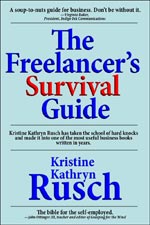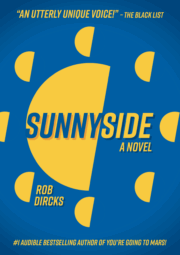Guest Post–The Freelancer’s Survival Guide:
When to Give Up Your Day Job
by Kristine Kathryn Rusch
 Every book on how to be your own boss has instructions about when to give up your day job. Each one of these books has a particular rule of thumb. Some say you cannot quit your day job until you have three months’ salary in the bank. Some say three years’ salary in the bank. Others say you need all your funding in place and at least five years’ salary.
Every book on how to be your own boss has instructions about when to give up your day job. Each one of these books has a particular rule of thumb. Some say you cannot quit your day job until you have three months’ salary in the bank. Some say three years’ salary in the bank. Others say you need all your funding in place and at least five years’ salary.
The sad truth of this economic downturn is that many people have already lost their day jobs and are trying to freelance just to make ends meet. Those people have major tasks ahead of them. They have to do all the things needed to bring some money in the house: Register at the unemployment office, move money from long-term emergency savings to now, and cut the frills out of the budget. They also have to look for a new job, which takes hours every day.
Then they have time to freelance.
Even though these are the folks who inspired me to write this Guide right now and post it on my blog every week, this one section will have less to do with them than it will with the rest of you.
Those of you who’ve been forced into freelancing, don’t let this section make you feel guilty. It’s the rare freelancer who follows the advice I’m about to give.
Most of us jumped from the day job into freelancing because of circumstances or personality. Most of us became freelancers at exactly the wrong times in our lives. We were going through a divorce and making changes anyway. Or our freelance work overtook our real work time, so one afternoon we just quit. Or we moved to another community and didn’t want the hassle of finding a new job (which, honestly, is a lot less hassle than freelancing itself).
Many of us figured freelancing would be easier than working for someone else, so we never searched for a job when we graduated from college. (Note to those of you thinking of this: Freelancing is not, let me repeat not, easier than working for someone else.) Or we had children so we figured that we’d make money instead of pay it out to day care or an au pair.
In other words, we incorrectly rationalized our choice to freelance and we jumped long before we should have. How did we survive? In a variety of ways, too numerous to mention. But let me toss a few at you: We cut our budgets. We moved to more cost-effective housing. We had understanding parents/siblings/friends with large bank accounts. We had spouses who worked. We learned the art of saving money—from clipping coupons to trimming the correct luxuries. We paid half the bills one month and the other half the next. (And dealt with the creditors calling every few hours.)
Eventually, those of us who survived as freelancers did several things: Our income caught up with and then surpassed our expenses. We learned how to thrive in a stressful environment (not kidding here—I know many freelancers who work better when the money is tight than they do when they have money in the bank). We learned how to be the best money managers in the world.
I will deal with all of these topics in sections down the road. Money management is such a huge, huge topic that I will use several sections to deal with it, and I promise to divide it into small sections. Money management is the key to freelance survival.
But for the sake of this section of the Guide: When do you quit your day job?
The real answer, the true answer, is deceptively simple. It is this: You quit your day job whenever you damn well feel like it.
But that doesn’t do you (or your family or your long-suffering spouse) any good. You want rules. You want advice. Those of you who are still employed and hating it want to know when you get to do what you want. (And remember last week’s essay, even when you’re freelancing, you’re not always doing what you want.)
So…when do you quit?
There are a million answers to that question, and they’re all individual. I can’t tell you when to quit your day job any more than you can tell me what to write tomorrow. Even my rules of thumb would be wrong for most of you.
Instead, I’m going to recast the question several times in this essay. Each refinement might bring you closer (or farther away) from quitting your day job.
The First Recasting: Should You Quit Your Day Job?
For most people, the answer to that question is no. Most people can’t handle all of the things it takes to be a full-time freelancer. Not that most folks aren’t smart enough or talented enough or even ambitious enough. The difference between most people and full-time freelancers boils down to one thing.
The ability to take risks.
Full-time freelancers are risk-takers. Most people aren’t.
Most people value the safe, the secure, and the familiar. This always astonishes me, because safe and secure is usually a mirage.
When Dean and I traveled the country in the mid-1990s, talking to wannabe writers about the ups and downs of freelancing, we always made one point: Nothing in this life is secure.
I would use this example: The single proprietors I had once worked for, from the forensic psychologist to the real estate agent, all could have closed their businesses in the space of a week. Or, as happened to a friend of mine, my boss could die, and the business would not survive him.
The wannabe writers who worked for small proprietors understood this. The wannabes who worked for corporations laughed. They laughed, and told me that their jobs were by definition secure.
Each time I heard this, I would stare at the speaker in shock, and then I would move on to a new topic. Because for many people at that time, jobs with large companies did seem secure.
But I had grown up in the Midwest. I had gone through college as the recession of the 1970s and early 1980s hit the car industry, starting a huge round of layoffs and plant closings. Once a week during that period, I manned the phones at a suicide hotline and fielded calls from people who had gotten laid off from their job, a job they saw as a family legacy, because their parents and grandparents had worked at the same plant.
That experience showed me graphically that no job was secure. Jobs could—and did—disappear overnight.
Such a thing doesn’t surprise those of you reading this now. The change of attitude began with Enron, a seemingly healthy corporation that one day told all of its employees to go home and, oh, by the way, your pensions and your stocks are worthless.
The pensions and stocks were a new wrinkle to that problem I had grown up with. Even I was shocked about that. Because my Depression-era parents had taught me that if you save your money, it’s there for you in times of crisis.
Well, it is. Unless you let someone else manage your savings. But that’s a topic for another day.
If the very idea of losing your day job makes your stomach hurt, you’re not ready to quit. If the job description I posted last week makes you uncomfortable, you might want to rethink the idea of full-time freelancing entirely. And if the idea of being without a regular paycheck—of not knowing exactly when and where the money will come from one year, five years or ten years from now—makes you crazy, you should never, ever quit your day job.
A lot of people have a small business in addition to their day jobs. They sell quilts or repair cars. They write novels or go on the lecture circuit. But they keep the day job because they like either the structure it gives (see the first section) or the regular paycheck that it brings in.
There’s nothing wrong with that. Just because you make money from something you love doesn’t mean you have to do that work full-time.
The Second Recasting: Who Should Quit A Day Job?
If the First Recasting didn’t scare you, and you still want to quit, should you? Maybe. If you’re reasonably healthy, single, and have some money in the bank, go ahead and quit. Your decision will only have an impact on you. Then use the rest of this Guide and other books on starting your own business to help you set up.
However (and this is a big however) if you have dependents, you need to think long and hard about quitting that job. Children cost money. Spouses lose their jobs. Elderly parents need care. The entire clan—at least those old enough to vote—should be in on this decision together.
The last thing you want to do is come home one day and say, “Honey, I quit my day job. I’m going to freelance full-time.”
I know a lot of people who’ve done just that. And, as you can well imagine, it doesn’t help the marriage any. Especially when the decision is made unilaterally and the family finances get rocked.
If you have a family and/or people who rely on your income, then quitting your day job and taking the risks to freelance full-time has to be a group decision. It should take a lot of planning, a lot of back-and-forth, and a clear understanding of what freelancing means. I would recommend that the non-freelancing part of the relationship read all of these posts, as well as those business books I mentioned. Because a pat on the head followed by a do-what-you want, honey, is going to backfire big time down the road.
If your job provides excellent health insurance, you need to think twice or even three times about quitting that day job. Every freelancer needs health insurance. Let me repeat that: Every freelancer needs health insurance. I know too many people who quit to freelance with money in the bank, had a health problem which ate up the money, and went bankrupt within a few years—all because they never bought health insurance.
Health insurance is extremely expensive, and what you can buy as a freelancer isn’t going to be as good as that provided by most employers.
If your spouse has a job with health insurance, then make sure you’re on the spouse’s policy and so are the kids before you quit your day job. Make sure the spouse’s policy is as good as yours.
If you’re not married and in reasonably good health, check the price of health insurance before you leave the job. All that careful planning that got you to the point of quitting probably didn’t take the five hundred to one thousand dollars per month you’ll need for a good health insurance policy.
As I said before, I’ll talk about insurance later. But the key for you here is simple: Never, ever go without it.
Finally, if you have a major job with a lot of seniority, you might want to think twice about quitting. Almost everyone quits the day job, finds out how hard the freelance life is, and goes back to the day job. Many try again later, only to fail a second time, and return to the day job. It usually takes three or four tries before someone becomes a permanent full-time freelancer.
I worked part-time jobs just to pay the rent. Even my editing jobs were part-time. I knew, for example, when I quit editing The Magazine of Fantasy & Science Fiction, that I would never get that job back. And I was okay with that.
Sometimes you can be rehired by your excellent company but without the seniority. And loss of seniority can be a bad thing. It feels wrong to ask your boss if you can be rehired at the same seniority, pay and benefits if the freelancing doesn’t work out. It’s the rare boss who’ll say yes. And if that boss is a mid-level manager, what’s to guarantee he’ll have his job when you throw in the towel six months down the road?
If you hate your day job and would never go back to it, then quit, no matter what your seniority (but think about that health insurance). If you don’t care about being rehired at the same level, then quit. But if these things matter to you, then quitting is probably a very bad idea.
The Third Recasting: Should I quit my day job or should I downgrade?
Many of you don’t know what I mean by downgrading. I mean this: If you have one of those high-level jobs that takes 80% of your time and chews up 98% of your stomach lining, you don’t have time to develop your freelance strategy. You’re just daydreaming about quitting that job. (And if my web statistics are correct, you’re reading these blogs while at that job.)
You don’t have time to do all the prep for quitting your day job. You think cold turkey would be nice.
But what about getting a lesser job, one with fewer hours, and less hassle? If that job also provides health insurance, then you’d be easing your way into the full-time freelance position.
And, honestly, that new job will be a lot easier to give up when the time comes.
You’ll probably have a cut in pay. (You’ll get a concurrent cut in heartburn.) You’ll have to deal with making less money, but you’ll still have that regular paycheck. It’ll be a good first test of your money management skills.
A lot of companies still offer a pre-retirement situation, one that allows the younger employees to advance while the older ones mentor and work fewer hours. See if your company offers that and if you’re eligible. A lot of companies will also let you change jobs, even downsize, without any penalty to you (except in salary). That’s worth investigating as well.
You still have a safety net, but you’ll have more time. You’ll also find out if you can manage to get your freelance work done with that extra time. And you’ll figure out if your household can sustain a lower level of income.
Psychologically, this one’s tough. People who identify themselves by their jobs and measure their self-worth by their raises and promotions won’t be able to do this easily. It’ll take a redefinition of self, and that’s hard. Some people simply can’t handle it.
But here’s the hard truth. If you can’t handle a decrease in salary or a lesser job, you’ll never be able to handle working from home. Because most people you know will think that you have been fired or laid off, and that’s why you’re suddenly at home. After you’ve worked at home for a while, those same people will think you’re not working at all, and will make mention of things like that.
When I was in my twenties, making a good living as a non-fiction freelancer, I found out that most people who knew me casually thought I was staying home for the kids. I had no kids. I still don’t. But that never stopped people from making that assumption.
The Real Question: Should I Quit My Day Job?
You’ve read all of the above and still think you want to quit the day job. You’re in the right emotional position and you have figured out a way to pay for your insurance. Your family is on board. Your home office sits empty, waiting for you to spend each and every day inside.
What do you have to do to make the actual leap?
First, you figure out how much money you need to live each and every month. Then you add half again as much for unexpected emergencies. Multiply that number by twelve, and that’s what you need for a year.
Most experts feel you need three years of income in the bank before quitting your job. And that money does not include the emergency fund that you should have already put away. (Never mind that most people live paycheck to paycheck and never manage that emergency fund. We’ll pretend that figure doesn’t exist at the moment—or that most of us are part of that group.) Experts recommend that emergency fund equal six months (at the bare minimum) of your income.
This reserve money, by the way, must be in actual cash. Not in your home equity or in the available credit of your credit cards or in your stock portfolio. This money must be relatively liquid—something you can get your hands on quickly, something that won’t decline with the vagaries of the market.
Let me use an example. Let’s say it takes you $3000 to make your monthly bills, with the mortgage, the new health insurance costs, and the groceries. Add another $1500 for unexpected emergencies, and calculate everything this way: It takes you $4500 per month to survive. That means you need to earn $54,000 per year to survive after taxes.
You don’t know what your taxes will be? Look at what gets taken out of your paycheck. Then realize that you’ll be paying for all of your social security. Right now, your employer pays half and you pay half. So it’s even more than you think. Factor that in.
If you need $54,000 per year, then you’ll need $162,000 to make your three year savings goal. Then you need to add in that emergency fund. Six months at $4500 per month comes out to an additional $27,000. All tolled, before you quit your day job, you’ll need $189,000 in the bank.
See why most people never go full-time freelance?
Full disclosure time: I have never ever had that kind of money in the bank. Every single time I got rid of my day jobs, I had enough contracts to cover the job’s salary. In other words, I had the promise of enough work to get me through the year.
Promises, by the way, are not hard cold cash.
I can live like this much more easily than I can go to a nine-to-five job. I’m much happier scrambling than I am doing someone else’s bidding for eight hours per day.
I also realize I’m rare.
Most full-time freelancers had some money in the bank when they quit their day job. Usually three to six months worth. In our fictional example, that’s $13,500 to $27,000—which are much easier numbers to achieve.
Often the folks who go full-time do have a working spouse, so many (most?) of the bills are covered.
So, ideally, you should have a lot of savings before you go full-time freelance. But as many people reading this guide already know, the ideal is seldom the reality. A lot of folks are surviving on their unemployment and hoping it lasts long enough for them to establish their freelance career.
Gosh, sounds like a lot of folks I know who became successful freelancers.
But this week’s topic is how to do quit your day job correctly.
And here’s the most important part. You already need an established business practice.
Meaning, you should already have earned money at the thing you want to do as a fulltime freelancer. If you want to be a full-time freelance writer, you better have sold more than one short story or one article to the local paper. If you want to set up your own legal practice, you better have clients who have already hired you and like you as their lawyer.
My ex-husband started a frame shop and art gallery about the time I went full-time non-fiction freelance. He had been framing art out of our back room. He was an artist when it came to cutting mats, find the right frames, and enhancing (and preserving) the art. He quit his day job because he was already earning the same amount of money in only a few hours per night. He knew he would make even more if he had a storefront—and he did.
He brought an established client base with him, and those people told their friends. The start-up was extremely successful. The transition was surprisingly easy. He made good money right from the start.
But the business failed because neither of us knew how to manage a business. We failed miserably, he and I. And the financial stress was one of the many nails in the coffin that had become our marriage.
I bring this up here because the stakes are very, very high. When you’re single, you can make these decisions easily. But when you have family, you’re taking an ever greater risk. You need to think through the ramifications of failure as well as the opportunities provided by success.
So…should you quit your day job?
Probably not.
But if you decide to do so, make sure you have these things in place:
1. An ability to take risks
2. Health Insurance
3. Familial support
4. Health Insurance
5. Enough money to get through hard times.
6. Health Insurance
7. An established client base
8. Health Insurance
9. An understanding that, the first few times you try to go full-time freelancing, you will probably fail.
Still want to quit your day job? Then good luck to you. A lot of us have done so. We’ve survived. You can too. And that’s what the rest of this Guide is all about.
—
 Kristine Kathryn Rusch is an award-winning mystery, romance, science fiction, and fantasy writer. She has written many novels under various names, including Kristine Grayson for romance, and Kris Nelscott for mystery. Her novels have made the bestseller lists worldwide and have been published in 14 countries and 13 different languages.
Kristine Kathryn Rusch is an award-winning mystery, romance, science fiction, and fantasy writer. She has written many novels under various names, including Kristine Grayson for romance, and Kris Nelscott for mystery. Her novels have made the bestseller lists worldwide and have been published in 14 countries and 13 different languages.
Her awards range from the Ellery Queen Readers Choice Award to the John W. Campbell Award. In the past year, she has been nominated for the Hugo, the Shamus, and the Anthony Award. She is the only person in the history of the science fiction field to have won a Hugo award for editing and a Hugo award for fiction. Her short work has been reprinted in thirteen Year’s Best collections.
She initially published The Freelancer’s Survival Guide on her website. It is also available as an ebook from Amazon or Barnes & Noble and as a trade paperback. She’s now doing a series on the changes in publishing in her regular business blog, The Business Rusch.


